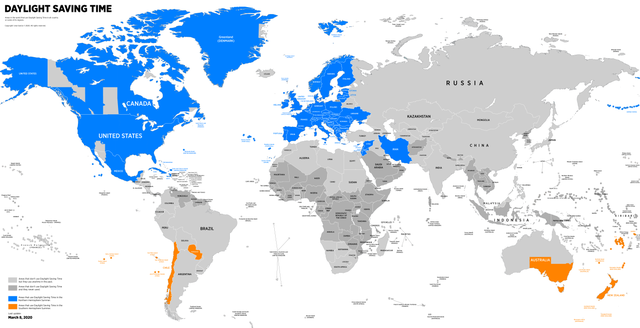Daylight Saving Time should be implemented permanently, year-round
Image used with permission from Wikimedia Commons
The changing of clocks is only widely popular in North America and Europe, with small parts of Oceania and South America switching their clocks twice a year as well.
With two states — Arizona and Hawaii — already doing away with Daylight Saving Time, the question of whether it should be federally removed altogether has arisen, both in Congress and among the public.
One of over 40 states to consider a similar change, Maryland could soon eliminate the seasonal adjustment in clocks that always seems to catch residents by surprise. While gaining an extra hour of sleep at the end of DST is a pleasant perk, the drawbacks of switching back and forth from DST to Standard Time outweigh the perceived benefits. An optimal solution would be to permanently keep DST due to its social and physical benefits.
Even though permanently keeping DST would mean that Americans never get back the one hour of sleep that was lost during the last switch from Standard Time to DST, they would be able to stay out later after school or after work due to a far later sunset. Although sunrise would be one hour later as a result, few people wake up early enough to even notice a difference in comparison to the number of people awake at 6 p.m. to 8 p.m when sunset typically occurs.
Altering the time also has an effect on our health, whether directly or indirectly. Strokes and heart attacks are more common in adults as a result of the current time system, with sleep deprivation in teenagers also on the rise as a result. According to Reuters, when the switch from Standard Time to DST does finally happen on the second sunday in March, there is a 6% increase in car crashes following the week of the change, so sticking with DST and longer changing clocks would lower car crashes and save lives.
DST also has economic benefits stemming back from the longer daylight in the early evening. Because of the extra hour before sunset, stores are more likely to have additional shoppers who like to stay out later than they would be able to with Standard Time. These customers would be putting their money back into the American economy, improving the country’s financial situation as a result.
With that said, DST does have some drawbacks as well just like every other alternative. While DST does lower the risk of damaging health issues such as strokes and heart attacks, its schedule causes humans to no longer live a lifestyle in sync with their circadian rhythm. A disrupted sleep cycle can have drastic effects such as decreased levels of attention and memory as well as diminished motor skills.
A permanent period of DST would, however, also diminish the risk of seasonal depression that typically arises after clocks are moved back to Standard Time with less daylight as a result. Other key benefits are the saving of millions of dollars that are usually lost when clocks are changed, a conservation of energy that would otherwise have been used, and, according to Business Insider, a 7% decrease in the rate of robberies committed.
Your donation will support the student journalists of Thomas S. Wootton High School. Your contribution will allow us to purchase equipment and cover our annual website hosting costs.
Daniel is a 2023 graduate.






![The 2025-2026 Editorial Board Alex Grainger, Cameron Cowen, Helen Manolis, Emory Scofield, Ahmed Ibrahim, Rebekah Buchman, Marley Hoffman, Hayley Gottesman, Pragna Pothakamuri and Natalie Pak (Chase Dolan not pictured) respond to the new MCPS grading policy. “When something that used to be easy suddenly becomes harder, it can turn [students’] mindset negative, whereas making something easier usually has a better impact. I think that’s where a lot of the pushback comes from. But if you put emotions aside, I do think this change could help build stronger work ethic,” Ibrahim said.](https://woottoncommonsense.com/wp-content/uploads/2025/09/fqr5bskTXpn0LRQMmKErLuNKdQYBlL726cFXBaWF-600x450.jpg)
